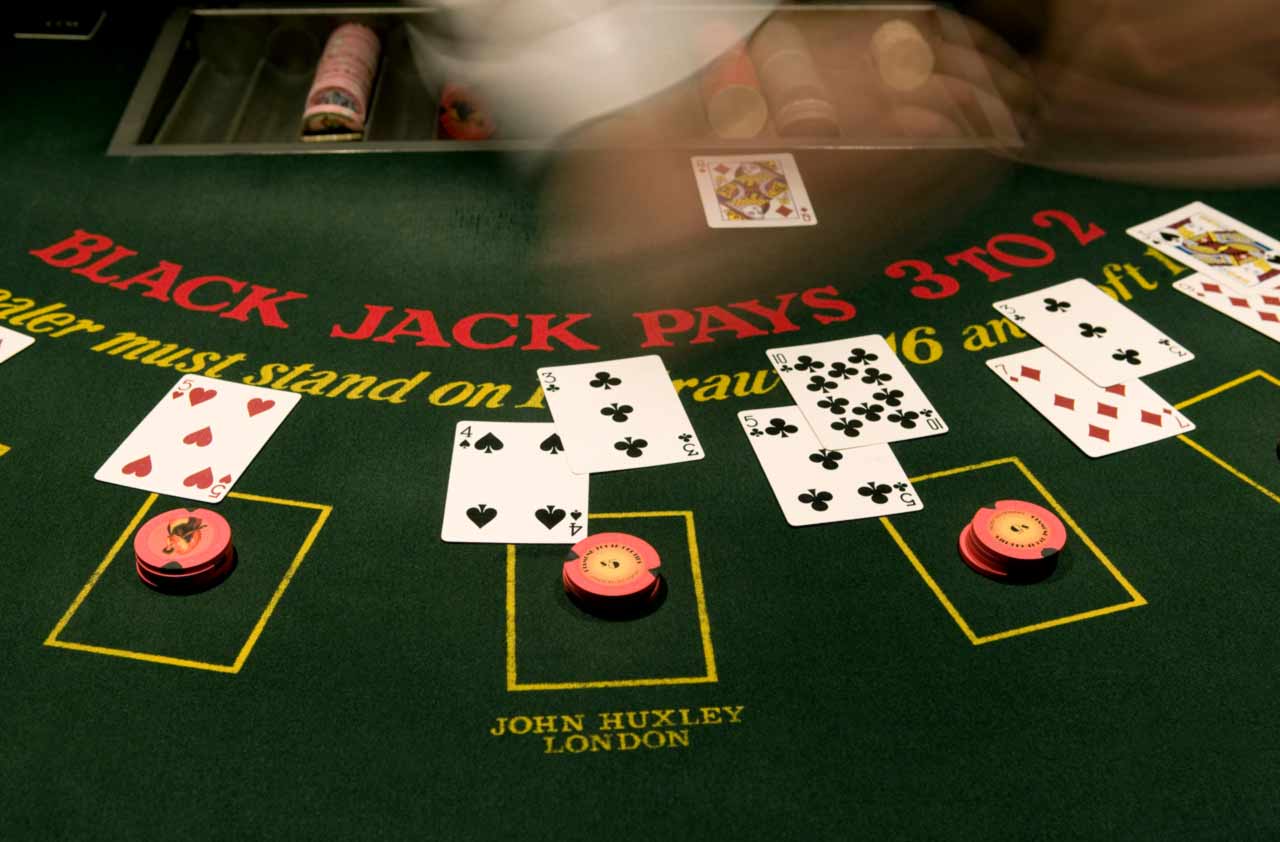Are You a Gambler, Speculator, Investor or Risk Manager?
To avoid making big money mistakes, investors should take a moment to examine themselves and their motivations.


Profit and prosper with the best of Kiplinger's advice on investing, taxes, retirement, personal finance and much more. Delivered daily. Enter your email in the box and click Sign Me Up.
You are now subscribed
Your newsletter sign-up was successful
Want to add more newsletters?

Delivered daily
Kiplinger Today
Profit and prosper with the best of Kiplinger's advice on investing, taxes, retirement, personal finance and much more delivered daily. Smart money moves start here.

Sent five days a week
Kiplinger A Step Ahead
Get practical help to make better financial decisions in your everyday life, from spending to savings on top deals.

Delivered daily
Kiplinger Closing Bell
Get today's biggest financial and investing headlines delivered to your inbox every day the U.S. stock market is open.

Sent twice a week
Kiplinger Adviser Intel
Financial pros across the country share best practices and fresh tactics to preserve and grow your wealth.

Delivered weekly
Kiplinger Tax Tips
Trim your federal and state tax bills with practical tax-planning and tax-cutting strategies.

Sent twice a week
Kiplinger Retirement Tips
Your twice-a-week guide to planning and enjoying a financially secure and richly rewarding retirement

Sent bimonthly.
Kiplinger Adviser Angle
Insights for advisers, wealth managers and other financial professionals.

Sent twice a week
Kiplinger Investing Weekly
Your twice-a-week roundup of promising stocks, funds, companies and industries you should consider, ones you should avoid, and why.

Sent weekly for six weeks
Kiplinger Invest for Retirement
Your step-by-step six-part series on how to invest for retirement, from devising a successful strategy to exactly which investments to choose.
With today’s economic uncertainty and market volatility, it’s important to understand the emotions that drive your investing decisions. Whether it’s greed, fear, optimism or something else, knowing what motivates you can help you avoid making mistakes.
Or, as Warren Buffett puts it, “Only when you combine sound intellect with emotional discipline do you get rational behavior.”
It takes all types to make the market run, but some approaches are more likely to lead to long-term success than others. Ask yourself which of these mindsets is most like yours:
From just $107.88 $24.99 for Kiplinger Personal Finance
Become a smarter, better informed investor. Subscribe from just $107.88 $24.99, plus get up to 4 Special Issues

Sign up for Kiplinger’s Free Newsletters
Profit and prosper with the best of expert advice on investing, taxes, retirement, personal finance and more - straight to your e-mail.
Profit and prosper with the best of expert advice - straight to your e-mail.
The Gambler
The gambler is usually looking to get rich quick or with little effort. For example, the odds of winning the grand prize in Powerball are 1 in 292,201,338; there’s no mathematical justification for buying a ticket. And yet, somebody’s going to win — and it could be you. So you play. That’s gambling.
In the world of options trading, most people are gamblers. Hoping that one big win will change their standard of living, they tend to put too much of their net worth behind their trades. They don’t pay attention to probability, and they don’t work out the odds.
If you gamble in the stock market, you might get lucky once in a while, but in the end, there’s a strong risk of losing.
The Speculator
Speculating involves taking a calculated risk with an uncertain outcome. It can be fine now and then, in the same way that going to a casino might be fun once in a while. But if it starts to consume you and you’re spending money that you can’t afford to lose, then it becomes a problem. You should thoroughly understand what you’re getting into and be prepared to lose all the money invested.
For most people, most of the time, that means speculating is inappropriate. Mark Twain says it this way: “There are two times in a man’s life when he should not speculate: when he can’t afford it, and when he can.”
The Investor
Investing is, of course, very different from gambling or speculating. It involves a process: learning fundamentals, doing some research and having confidence in a company’s financial details.
A careful investor makes decisions based on sound information, not hope or emotion.
Here’s another Buffett quote: In 2006, he told shareholders, “You have to be able to play out your hand under all circumstances. But if you can play out your hand, and you’ve got the right facts, and you reason by yourself, and you let the market serve you and not instruct you, you can't miss.”
That means a smart investor doesn’t just look at a price and say, “OK, that must be what the company is worth.” He estimates the actual value of the company based on his research, or the research of a trusted financial professional.
Investing does involve risk, including the potential loss of principal, since no strategy can guarantee a profit, and few protect against loss in periods of declining values. The key is to not get emotionally involved. An investor asks, “Can I make a good decision today to buy this asset based on sound information?” If the answer is yes, he moves forward.
The Risk Manager
As a person approaches or enters retirement, his thinking has to shift. Accumulating assets is no longer the goal; converting assets to income is what’s important.
Risk tolerance should be a factor for investors of all ages, but for those in or near retirement, it must be a primary focus. With little or no time to recover, a large loss can destroy your nest egg.
The risk manager thinks about what can be controlled in retirement ‐ and that’s certainly not the markets. It’s a matter of what portion of retirement assets should be in market-based assets (stocks, bonds, mutual funds, etc.) and how much should be in alternative assets (indexed annuities, real estate, commodities, etc.). Volatility is the enemy; diversification is the risk manager’s friend.
Did you spot yourself in any of the above investment approaches? Maybe you’re a mix of two or three, or even all four.
The trick is to be self-aware whenever you’re making a money move. Ask yourself each time, “Am I being a gambler, a speculator, an investor or a risk manager?” You just might save yourself from making a retirement-wrecking mistake.
Kim Franke-Folstad contributed to this article.
Profit and prosper with the best of Kiplinger's advice on investing, taxes, retirement, personal finance and much more. Delivered daily. Enter your email in the box and click Sign Me Up.

David Braun is an Investment Adviser Representative and Insurance Professional at David Braun Financial & Insurance Services Inc. Braun has more than 25 years of experience in the financial industry, and holds Chartered Financial Consultant (ChFC), Certified Life Underwriter (CLU) and Life Underwriter Training Council Fellow (LUTCF) industry designations. Investment advisory services are offered through Resility Financial Inc., a Registered Investment Adviser. Insurance services are provided through David Braun Financial & Insurance Services Inc. CA #0678292
-
 Nasdaq Leads a Rocky Risk-On Rally: Stock Market Today
Nasdaq Leads a Rocky Risk-On Rally: Stock Market TodayAnother worrying bout of late-session weakness couldn't take down the main equity indexes on Wednesday.
-
 Quiz: Do You Know How to Avoid the "Medigap Trap?"
Quiz: Do You Know How to Avoid the "Medigap Trap?"Quiz Test your basic knowledge of the "Medigap Trap" in our quick quiz.
-
 5 Top Tax-Efficient Mutual Funds for Smarter Investing
5 Top Tax-Efficient Mutual Funds for Smarter InvestingMutual funds are many things, but "tax-friendly" usually isn't one of them. These are the exceptions.
-
 Social Security Break-Even Math Is Helpful, But Don't Let It Dictate When You'll File
Social Security Break-Even Math Is Helpful, But Don't Let It Dictate When You'll FileYour Social Security break-even age tells you how long you'd need to live for delaying to pay off, but shouldn't be the sole basis for deciding when to claim.
-
 I'm an Opportunity Zone Pro: This Is How to Deliver Roth-Like Tax-Free Growth (Without Contribution Limits)
I'm an Opportunity Zone Pro: This Is How to Deliver Roth-Like Tax-Free Growth (Without Contribution Limits)Investors who combine Roth IRAs, the gold standard of tax-free savings, with qualified opportunity funds could enjoy decades of tax-free growth.
-
 One of the Most Powerful Wealth-Building Moves a Woman Can Make: A Midcareer Pivot
One of the Most Powerful Wealth-Building Moves a Woman Can Make: A Midcareer PivotIf it feels like you can't sustain what you're doing for the next 20 years, it's time for an honest look at what's draining you and what energizes you.
-
 I'm a Wealth Adviser Obsessed With Mahjong: Here Are 8 Ways It Can Teach Us How to Manage Our Money
I'm a Wealth Adviser Obsessed With Mahjong: Here Are 8 Ways It Can Teach Us How to Manage Our MoneyThis increasingly popular Chinese game can teach us not only how to help manage our money but also how important it is to connect with other people.
-
 Looking for a Financial Book That Won't Put Your Young Adult to Sleep? This One Makes 'Cents'
Looking for a Financial Book That Won't Put Your Young Adult to Sleep? This One Makes 'Cents'"Wealth Your Way" by Cosmo DeStefano offers a highly accessible guide for young adults and their parents on building wealth through simple, consistent habits.
-
 Global Uncertainty Has Investors Running Scared: This Is How Advisers Can Reassure Them
Global Uncertainty Has Investors Running Scared: This Is How Advisers Can Reassure ThemHow can advisers reassure clients nervous about their plans in an increasingly complex and rapidly changing world? This conversational framework provides the key.
-
 I'm a Real Estate Investing Pro: This Is How to Use 1031 Exchanges to Scale Up Your Real Estate Empire
I'm a Real Estate Investing Pro: This Is How to Use 1031 Exchanges to Scale Up Your Real Estate EmpireSmall rental properties can be excellent investments, but you can use 1031 exchanges to transition to commercial real estate for bigger wealth-building.
-
 Should You Jump on the Roth Conversion Bandwagon? A Financial Adviser Weighs In
Should You Jump on the Roth Conversion Bandwagon? A Financial Adviser Weighs InRoth conversions are all the rage, but what works well for one household can cause financial strain for another. This is what you should consider before moving ahead.